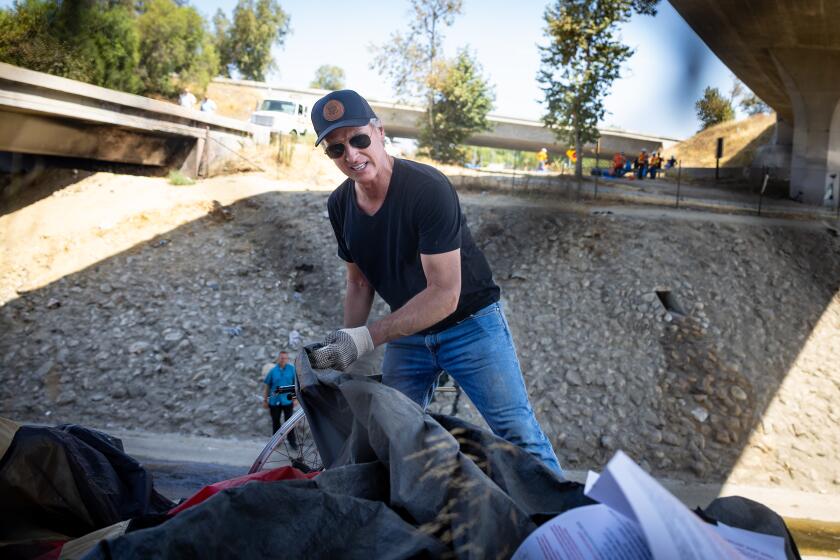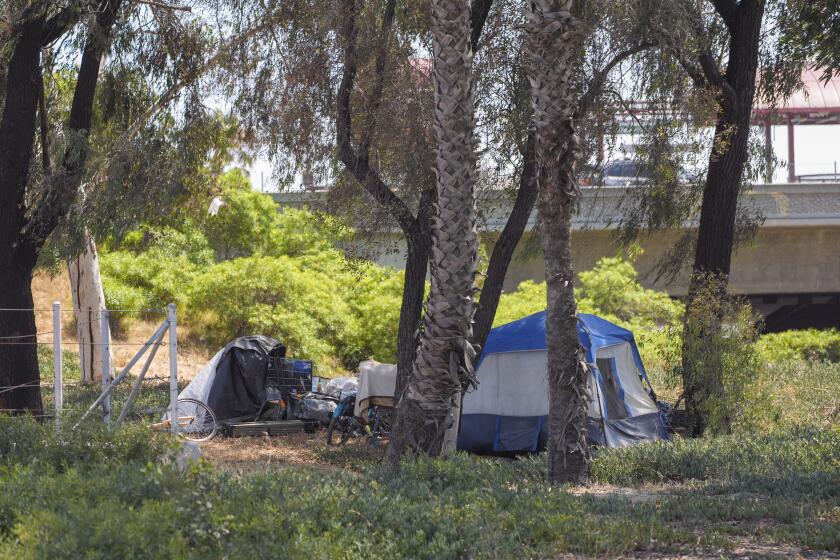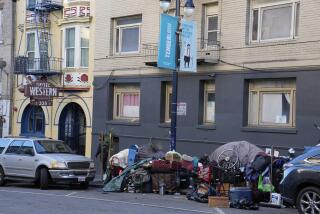Editorial: Newsom and San Francisco take a wrong turn on homelessness

- Share via
It’s been disappointing to see Gov. Gavin Newsom take a hard line on homelessness by directing state agencies and departments to clear encampments on state-owned land, such as freeway embankments, and encouraging local governments to do the same.
Meanwhile Los Angeles city and county leaders continue to do the hard but effective work of reaching out to people in encampments and getting them into temporary and permanent housing even when it takes weeks or months to do so.
Gov. Gavin Newsom of California threatened to redirect funding from counties that fail to reduce homelessness in their communities during a visit to Pacoima following his controversial order for state agencies to remove encampments.
The Los Angeles County Board of Supervisors last week also rejected any attempt to criminalize homelessness. In a rebuke to Newsom’s directive, it voted last week to affirm its position that no one should be jailed simply for camping outdoors.
Mayor Karen Bass’s Inside Safe program to move people out of encampments into motel and hotel rooms temporarily has made a measurable difference in the size of street homelessness. In the most recent count, the number of unsheltered homeless people in the city dropped 10.4 % while the number living in shelters rose by 17.7%. And the availability of new city-funded permanent housing units contributed to the 2.2% overall decrease in homelessness in the city.
Three new studies shed new light on homelessness in Los Angeles, painting a mostly grim picture, with some glimmers of hope.
Are homeless people still shooed off sidewalks by clean-ups and law enforcement? Sure. And that’s troubling. But Bass has denounced arresting homeless people as a way out. San Francisco’s mayor is ready to use it as a tool.
Mayor London Breed has chosen to follow Newsom’s example and undertake a “very aggressive” clearing of encampments in which police cite and move people along if they don’t take an offer of shelter on the spot. This ignores the fact that there are 8,300 homeless people in San Francisco, but the city’s 3,600 shelter beds are nearly at capacity. Breed followed that by ordering outreach workers to offer bus, train or plane tickets out of town to homeless individuals — if they have a connection to the destination — before offering any services such as shelter. This seems less about the mayor aiding homeless people than banishing them as she runs for reelection.
Bottom line, nothing in San Francisco’s approach or the governor’s executive order will reduce homelessness — and Newsom should know better.
Supreme Court ruling in Grants Pass case allows cities to criminalize people for being poor. How does it solve homelessness by fining or jailing people for sleeping outside if they have no choice?
As he himself pointed out in his announcement last month, he has allocated $24 billion in state funds to help cities and counties provide services and house their homeless residents. He created Project Roomkey, the program that cities and counties used to move vulnerable homeless people into empty hotel and motel rooms during the COVID-19 pandemic using federal emergency relief funds. He started the Homekey program that funds acquisition of housing for homeless people. And he made $1.3 billion available in federal funds through the Housing and Homelessness Incentive Program to encourage Medi-Cal healthcare providers to invest in local homelessness programs.
Yet California has the largest number of homeless people in the country. If there are still homeless people here after spending billions on interim and permanent housing, it’s because the problem is that big and that intractable. Newsom’s order and Breed’s sweeps come after the recent Supreme Court decision allowing Grants Pass, Ore. to cite and arrest homeless people living outside even if there is no available shelter. But these crackdowns offer only the illusion that homelessness can be resolved at particular sites by moving people along.
Instead of criminalizing ‘public camping’ we need more housing for the mentally ill and addicted. California has spent billions. It’s going to cost more.
Housing is unaffordable, and it’s too difficult and expensive to add affordable housing in cities, such as Los Angeles, that protect single-family zoning and limit where apartments can be built. Mass incarceration has led to hundreds of people coming out of jails and prisons without housing. Structural racism has made Black people a disproportionate percentage of homeless populations across the country. Even the 24% of homeless people who say they are suffering from a serious mental illness or the 27% who report substance abuse are, with rare exception, desperately poor. Most can’t get the help they need unless they get housed first.
Homelessness is the most stark example of wealth inequality in the country. It’s been suggested that some Californians are just tired of seeing it. They have “encampment fatigue.” Well, no one has more fatigue than the people living in encampments.
California progressives don’t like Gov. Newsom’s order to clear homeless encampments. But the Democrat is working to right what Republican Ronald Reagan got wrong as governor.
The solution is obvious — stay focused on getting more housing built, bought or leased. This work of housing homeless people is expensive, and it doesn’t happen overnight. Moving people inside can sometimes take weeks of outreach. But it works.
Another thing that has worked: Medi-Cal providers funding homeless services. The County Homeless Initiative has received $114 million in funding from L.A. Care and Health Net to support the county’s master leasing program that provides apartments to homeless people. Medi-Cal healthcare providers are also venturing into low-income and homeless housing projects — and we hope this support continues.
It’s encouraging that Los Angeles city and county leaders appear to understand what Newsom and San Francisco’s mayor seem to have forgotten: Simply pushing people off a sidewalk has never reduced homelessness, and it won’t work now.
More to Read
A cure for the common opinion
Get thought-provoking perspectives with our weekly newsletter.
You may occasionally receive promotional content from the Los Angeles Times.















